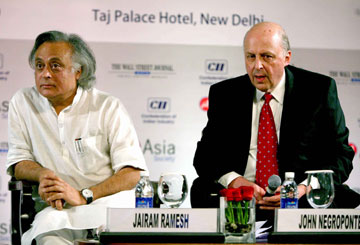The final panel of the ACC brought together experts in information technology, business, and academia to discuss the concept of leadership in India. Leadership is evolving on two levels in India: internally, as Indians find solutions to local issues, and externally, as India’s rising economic power translates to a need for more responsibility in the international community.
Kishore Mahbubani, Dean of the Lee Kuan Yew School of Public Policy, National University of Singapore looked externally, arguing that India must prepare its population to take on more responsibility in the new global order. Dr. Mahbubani said that India must take responsibility commensurate with the level of America’s or Europe’s. Tarun Das, President of Aspen Institute India and Former Chief Mentor of CII stressed that for India to cultivate better leaders there must be a change in mindset. That will take time. Among other changes, there must be a refocusing on long-term sustainability instead of on short-term all-out gains. Rajendra Pawar, Chairman of NIIT Ltd, said that although India has gone a long way in the IT sector, there is still great potential. There is a young workforce, which is reasonably well-educated and is aspiring for greatness. That bodes well for India’s internal leadership. Raul Rai, Managing Director, General Atlantic, emphasized that the youth of India are not only well-equipped to succeed, but that they feel more confident of their success. This is the generation that Mr. Rai hopes will redefine India, a generation that will have strong political and economic leadership in the world’s largest democracy.


